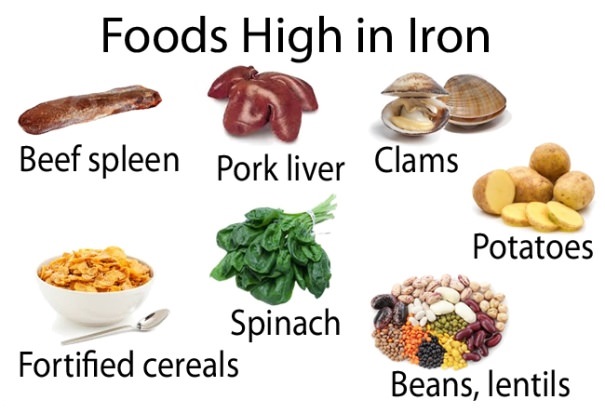
Image source: https://ridhelp.com/wp-content/uploads/2016/12/Foods-High-Iron.jpg
Due to the biological differences and reproductive processes in women, they are more vulnerable to the affects of having an Iron deficiency. Figures show that a significant number of people, of both genders, do not receive the minimum suggested daily quota of Iron.
The result is, that these people have a variety of Health problems that range from the mild, which by simply increasing the daily iron intake will remedy, to the severe. The most severe cases often require complex treatments which could have been avoided by consuming the recommended, daily quota of Dietary Iron.
One of the more essential functions of Dietary Iron is to oxygenate the blood. Iron also provides the necessary energy metabolism for the neural development of babies as they grow and develop in the womb. Iron serves to promote the important functioning of the body's immune system, particularly in the production of the white blood cells essential to fighting infection and disease. The body needs iron in order to make proper use of the B vitamins.
Women, need to make certain that their Iron levels are adequate during their pregnancy, as the Health, growth and development of their baby depends on it. On the other hand, because of blood loss during normal menstruation, most women need to take special care during their period to make sure their Iron levels stay at the recommended levels.
Iron is an important mineral which enters into the vital activity of the blood and glands. Iron exists chiefly as haemoglobin in the blood. It distributes the oxygen inhaled into the lungs to all the cells. It is the master mineral which creates warmth, vitality, and stamina. It is required for the healthy complexion and for building up resistance in the body.
The chief sources of iron are grapes, raisins, spinach, all green vegetables, whole grain, cereals,dried beans, dark coloured fruits, beets, dates, liver and egg yolk. The Indian Council of Medical Research has recommended an allowance of 20 to 30 mg. of iron in a balanced diet for an adult.Iron deficiency is generally caused by severe blood loss, malnutrition, infections and by excessive use of drugs and chemicals. Deficiency of dietary iron may cause nutritional-anaemia,lowered resistance to disease, a general run down condition, pale complexion, shortness of breath on manual exertion, and loss of interest in sex.
Iron is the classic remedy for anaemia. However, there are several forms of anaemia, and iron deficiency anaemia is only one. If one is taking iron pills due to insufficient intake of iron in the normal diet, one should also take atleast 40 mg. of folic acid or folate every day, along with 10 to 25 mg. of vitamin B12. Both these vitamins are essential in building healthy blood cells.
for more useful information on Ayurveda and Astrology, Alternative Therapies and Ayurveda Skin care.